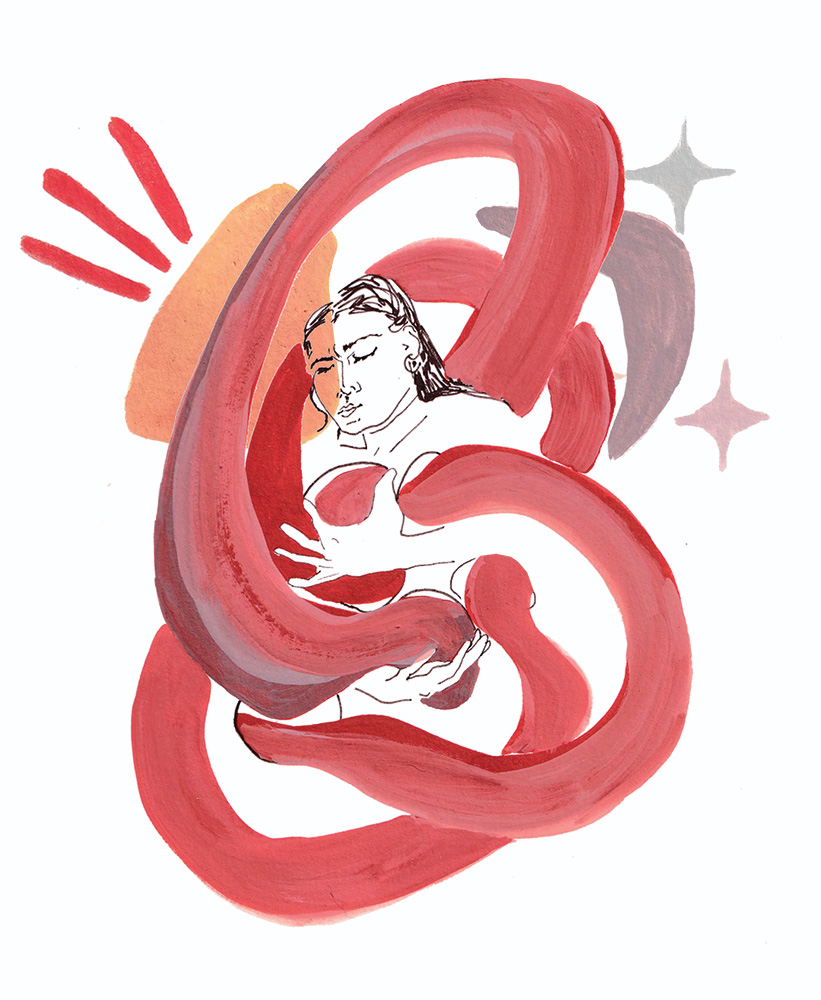The Beast That Resides in You, in Me, in the Rain

art by Ellen Abrams King
A beast moved in when I was nine. Mother had found it in the rain, at a bus stop, hissing and spitting like a cat, wounds dripping pus and blood that swirled like strawberry cheesecake into the drain. She gave the beast my room and told me to be grateful.
“It was cold,” Mother said. “It needs help. We are lucky we can help.” A bright smile lit her face. “You can move into Tani’s room!”
Tani’s room was small and I hated the top bunk and my desk wouldn’t fit so it stayed in the basement where the beast lived. I did my homework at the kitchen table rather than descend to where the beast might see me, hear me, taste me on the air.
When it came, the beast stood steaming in the rain. I wanted to go to my room, lock the door, refuse to come out. Instead, I said, “Hello, you’re going to be living in my room,” because I’d been taught to be polite at the cost of everything.
The beast exhaled thin gray smoke. “I’m scaring you,” it announced, and it was true. Had it been true before the beast spoke? I wasn’t sure.
The beast burrowed into the cardboard and plastic totes in my mostly empty room in the basement, only emerging to be fed boiled chicken skin. Slurp, it would suck the skin down like spaghetti, slurp, leathery tongue searching for any missed driblets. I watched, fascinated, still scared, from the doorway of the garage, as the pale pink goosebumped skin slipped through those lips and away.
“It’s good,” the beast said, a little wetly. “Do you want one?” It held out the chicken skin, melted over its hand like deflated brains. I shook my head and ducked away to the sound of hard laughter.
Before the beast, things were still not good. But I had friends, even if I didn’t understand them nor they me, and I went to school, even if I hated it, and I knew when I awoke what each day would bring. My mother would read us the Bible before school. After dinner, again. In between I would play or eat or read.
After the beast, my friends seemed more familiar, but in a way that made me regret the new comfort, this recognition of their sadness and coarse humor and gravity as something that now lived inside my soul. After the beast, school became a refuge. After the beast, I never knew what to expect when I awoke.
Sometimes, the beast would talk to me. Tell stories of grand adventures, dragons devoured, treasures troved. Once, the beast said, it had been loved and secure, but the world turned against them. It had been taught to be what it was, forced by a world that did not care for beasts. On those days, I felt sympathy for the beast. I even loved it.
But sometimes the beast would snarl, smoke stinging my eyes and clogging my breath. Mother seemed always to be away when this happened, told me I must be exaggerating so many times I stopped telling her at all. I tried to protect Tani, but when the beast was angry, we both got burned. Acid would spray, unexpected. With the acid, hard words, nasty truths. It never touched me–words were enough.
“You will never be loved like Tani,” it would whisper, breath hot and sticky against my ear. “Tani is too cute, too sweet. You’re just too ugly, too messed up, too wrong.”
A burn here, a blister there. I learned to guard my face, but I never managed to guard my heart. Soon it was full of holes.
As I grew, the beast slipped into those holes. Eventually I could hardly remember a time when the beast was not there, coiled and smoking around the things that made me, me. I came to admire the beast, longing to be as powerful, as potent. I felt a distilled thing, weak and thin, without impact. Mother saw through me, saw only what she dreamed of me, imagined me to be. Tani didn’t see me at all. I thought, if I could be enough like the beast, I could take on substance, reclaim some of the self that had faded.
Smoking helped, stolen cigarettes lit by matches around the corner from a bus stop. I would exhale great clouds of darkness, stinging breath on my tongue, and feel a roar in my chest. The secret-keeping helped too, filled me with something other than the fear the beast had put into me.
Determined to stay mean and narrow like the beast, I reduced my diet.
“You don’t want to eat that,” Mother said. “It will make you sick.” But still she boiled it, slid the plate to me, seeing me in such a way that I felt alive and almost laughed for the flush of warmth and selfhood. It mattered not at all that her expression was horrified, full of disgust, she was seeing me.
Determined to keep that look on me, at me, I pinched the cold white-pink of the skin and shoved it in my mouth. Cold and tacky, it stuck on my tongue like a sheath, like a layer of my own flesh had come off and needed devouring, and I almost vomited but the beast took my arm, staring into my eyes, and I swallowed. After that it got easier, but my mother looked away.
As I grew, we shared other things, the beast and me. The beast told me about potions and princes, kings and concoctions.
“Ways to feel,” it said, stroking its cheek with a long finger, “more than you would ever have thought possible.”
I wanted to feel, needed to feel. Wasn’t sure I could remember how to feel. I found friends who know where such apothecaries could be found, in dark places filled with people I recognized, people as transparent and hollowed out and beast-filled as me. The potions worked best the first time, but they filled the holes the beast didn’t, the holes the beast left behind.
Because one day the beast left.
“I’ve had enough of this,” it said. “Time to move on. Oh. You can have your room back.”
I blinked, confused. “But… are you coming back?”
Confusion. “Why would I?”
How could I rebuild my life without the beast coiled in the center? How could I have growing pains without something to compare them to? The absence yawned like a hunger, a need, some nights so empty and hollow I’d have done anything to fill it. I tried, tried everything. Nothing did more than ease the pain, take the edge off, leaving me more hollow than before.
Mother looked away more and more, never quite meeting my eyes. Did she blame herself for bringing the beast into our lives? Did she even realize what she’d done? Unsure how to even phrase the question, certain that every possible answer would leave me even emptier than before, I looked away for so long that one day there was nothing to look back to.
Tani, who’d never been as hollow as me, who was still cute and sweet and loved, raised an eyebrow at me one day. “If you keep trying to fill them, how do you expect them to heal?”
I considered that maybe she was right. Prodding, poking at the holes widened them, guaranteed their persistence. Could I leave them be long enough to heal?
It was impossible at first. I could not bear the emptiness. It ached, it screamed within, demanding satisfaction. I embraced the pain, the suffering, telling myself that if it didn’t kill me, I might be stronger than I thought. But if it killed me, left me holed out entire, at least it would be over. I’d let the beast in, after all, wasn’t it my fault, too? Maybe more my fault than anyone else’s, even. A beast is a beast, after all. It had not deceived anyone.
Slowly, though, I managed to sit with my holes, my beastliness. I craved boiled skin, grew desperate for a potion or prince to stuff into the hollowness of me, but let myself be empty without feeling hollow. I put things into the world instead of taking them and the holes began to fill with other things. A sunrise earned by hiking. Fresh bread baked by my own hands. A rough sketch of a monster looming over a little girl.
The holes never went away, but they healed, filled with a life clawed from the grip of a beast. Like swiss cheese melted and smoothed over. I stopped being polite for the sake of it, demanding instead that such treatment be earned. I lived a life of expectations, openness, hope. In the end, though of course I would have changed it all, I even finally learned to be grateful for what had made me, me.
And then, one rainy evening, the doorbell rang. There on my porch, standing in the rain, stood the beast.
“Can I come in?” It looked just as it had all those years ago and my healed wounds pulsed in recognition. It looked like family, like home, like something lost but never really given up on. “I’m cold. I need help.”
I could help. I had a basement, chicken in the fridge. We stood there for a long moment, the light from my life spilling over the beast dripping on my doorstep. I owed them so much, in the end. I wouldn’t have found the light without them, wouldn’t have been a latticework of patched-up holes filled with beautiful courageous things without them. What could it cost to help them? Let them in, just a little?
Thunder boomed. Lightning flashed. Without a word, I closed the door.


